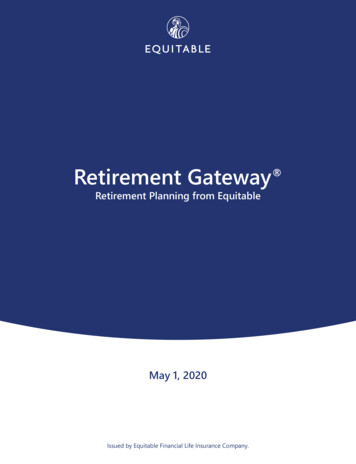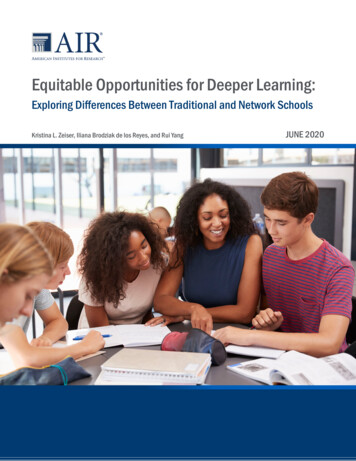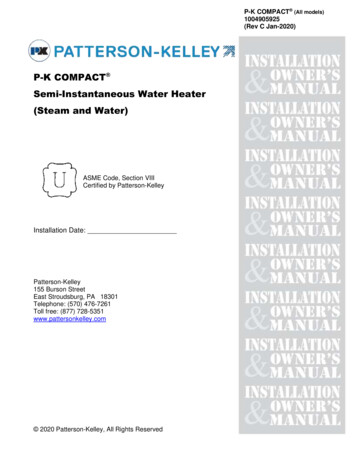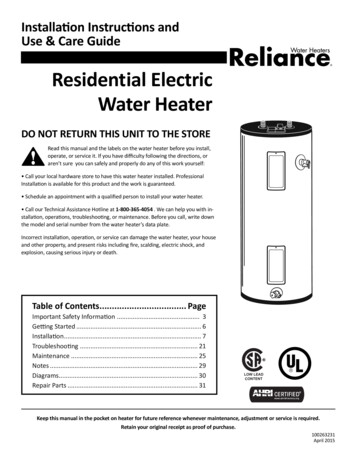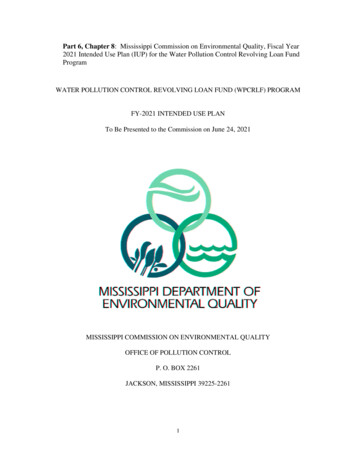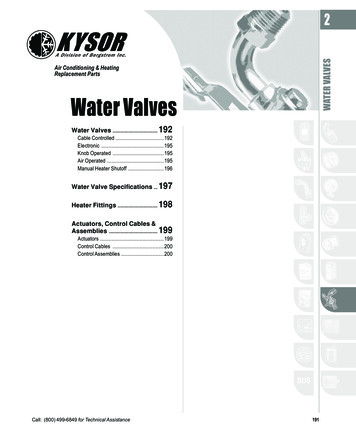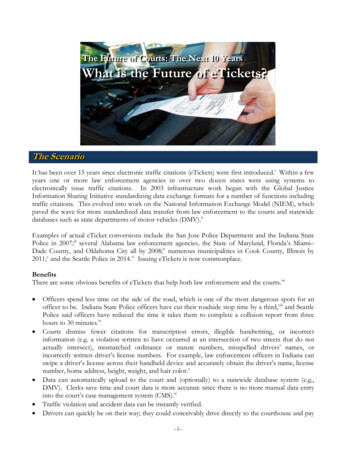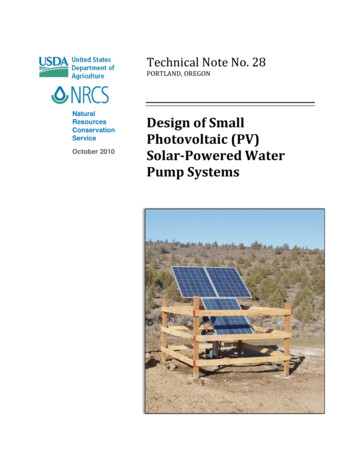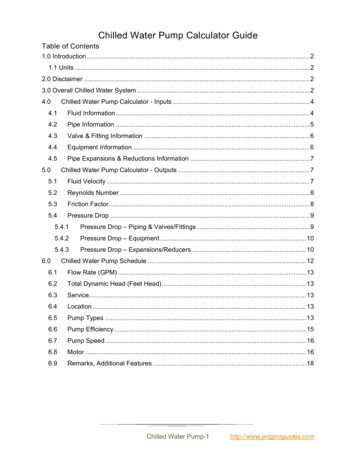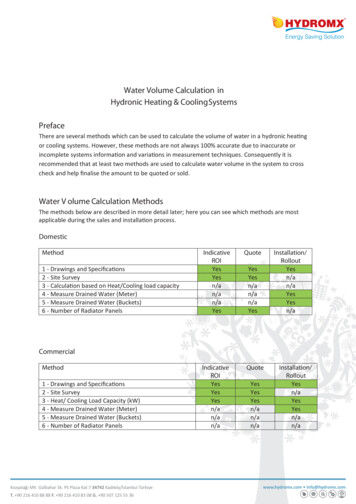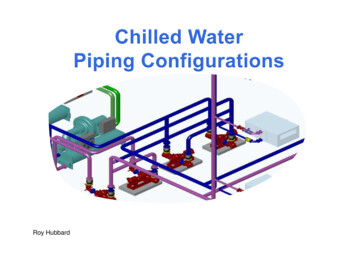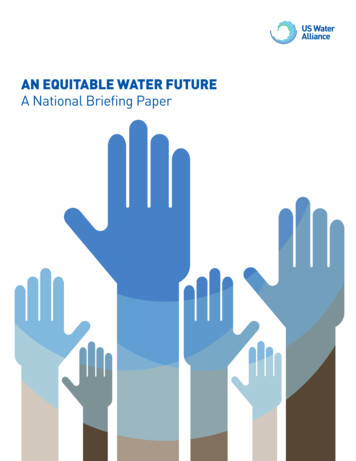
Transcription
AN EQUITABLE WATER FUTUREA National Briefing Paper
2US Water Alliance
PREFACEWater is essential to prosperity and progress. The sadreality is that water challenges disproportionately affectthe most vulnerable in America. At the same time, smartand equitable water management can foster opportunityfor all people and communities.This report presents a water equity framework, drawingon the wisdom and innovation of hundreds of leadersfrom across the public, nonprofit, and private sectors.It spotlights promising strategies for ensuring that allpeople have access to safe, clean, affordable water, benefitfrom water infrastructure investment, and are resilientin the face of a changing climate.The members and staff of the US Water Alliance arecommitted to advancing equitable water management.We stand ready to work in partnership to support, scale,and sustain the promising practices that are cataloguedin this report. Together we can build stronger communitiesand a more equitable America.One Water, One Future.Kevin ShaferExecutive Director,Milwaukee MetropolitanSewerage District; BoardChair, US Water AllianceRadhika FoxChief Executive Officer,US Water AllianceAn Equitable Water Future1
ACKNOWLEDGMENTSThe US Water Alliance is deeply grateful to the KresgeFoundation and the Charles Stewart Mott Foundation fortheir support of this project.This report would not have been possible without theexceptional contributions of Program Managers Zoë Rollerand Danielle Mayorga. A special thanks to Zoë for takingthe lead on the research and writing of this report, as wellas to Danielle for her significant research and writingcontributions. This paper reflects their thoughtfulnessand commitment to the complex issues of water equity.We greatly appreciate Gina Wammock for her stellareditorial direction, Elisa Speranza for her feedbackthroughout the writing process, as well as Megan Demitand Abigail Gardner for their support.We thank PolicyLink for sharing their insights and framingon infrastructure equity.We also thank the members of the US Water Alliance,especially our One Water Council, for sharing theirfeedback and innovative ideas.2US Water Alliance
KEY STAKEHOLDERSA diverse group of stakeholders shared their insightsthrough interviews, surveys, conversations, and reviews.Their experience and knowledge greatly enriched thisreport. We thank and appreciate the following leaders fortheir time and expertise. Charisma Acey, Assistant Professor ofCity and Regional Planning, Universityof California, Berkeley Paul Boyer, Program Director,Community Development, Self-HelpEnterprises Drew Curtis, Community Developmentand Environmental Justice Director,Ironbound Community Corporation Zelalem Adefris, Climate ResilienceProgram Manager, Catalyst Miami Jessica Buendia, Community BenefitsCoordinator, San Francisco PublicUtilities Commission Joanne Dahme, General Manager ofPublic Affairs, Philadelphia WaterDepartment Lila Cabbil, Founder, People’s WaterBoard Michael Davis, Director,Environmental Justice and ServiceEquity Division, Seattle Public Utilities Anisha Anantapadmanabhan,Manager, Water Infrastructure, Ceres Katherine Baer, Director of Scienceand Policy, River Network Meera Baht, North America CitiesDirector, The Nature Conservancy Colin Bailey, Executive Director,Environmental Justice Coalition forWater Nadia Barhoum, Researcher, HaasInstitute for a Fair and Inclusive Society Aaron Bartley, Executive Director andCo-Founder, PUSH Buffalo Gary Belan, Senior Director, CleanWater Supply Program, AmericanRivers Ramont Bell, Outreach Coordinator,Faith in Place Len Benson, Chief Engineer, DC Water Elin Betanzo, Director and SeniorPolicy Analyst, Northeast-MidwestInstitute Nadia Bogue, Senior Project Manager,Milwaukee Metropolitan SewerageDistrict Mark Bowman, General Manager,Gogebic-Iron Wastewater Authority Emily Chatterjee, Senior Counsel, TheLeadership Conference on Civil andHuman Rights Julius Ciaccia, Trustee, Board ofTrustees, Northeast Ohio RegionalSewer District Susana De Anda, Co-ExecutiveDirector and Co-Founder, CommunityWater Center Lois DeBacker, Managing Director,Kresge Foundation Elizabeth Cisar, Senior ProgramOfficer, Environment Program, JoyceFoundation Ella Delio, Director of Environmentaland Regional Initiatives, Greater NewOrleans Foundation Christopher Coes, Vice President, RealEstate Policy and External Affairs,Smart Growth America Lisa Wojnarowski Downes, Director,Freshwater Stewardship, The NatureConservancy Donald Cohen, Founder and ExecutiveDirector, In the Public Interest Kevin Doyle, Principal, Green Economy Paula Conolly, Director, GreenInfrastructure Leadership Exchange Ellen Drew, Regional EnvironmentalManager, Rural Community AssistanceCorporation Jennifer Cotting, Research Associate,Environmental Finance Center,University of Maryland Maureen Duffy, Vice President,Corporate Communications andExternal Affairs, American Water Anita Cozart, Senior Director,PolicyLink Marc Edwards, Charles P. LunsfordProfessor, Virginia Tech Hope Cupit, President and CEO,Southeast Rural Community AssistanceProject Juliet Ellis, Assistant General Manager,External Affairs, San Francisco PublicUtilities Commission Jonathan Cuppett, Research Manager,Water Research Foundation Frank Ettawageshik, ExecutiveDirector, United Tribes of MichiganAn Equitable Water Future3
Sharon Green, Legislative andRegulatory Liaison, Sanitation Districtsof Los Angeles County Vanessa Leiby, Executive Director,Water and Wastewater EquipmentManufacturers Association Hank Habicht, Managing Director, SAILCapital Partners John Lisle, Chief of External Affairs,DC Water Denise Fairchild, President and CEO,Emerald Cities Adel Hagekhalil, Assistant Director,LA Sanitation Chanceé Lundy, Co-Owner andPrincipal, Nspiregreen Laura Feinstein, Senior ResearchAssociate, The Pacific Institute Chris Halter, Executive Director, St.Bonaventure Indian Mission and School Deeohn Ferris, President andFounder, Sustainable CommunityDevelopment Group Peter Hammer, Professor of Law,Wayne State University Chris Marchi, Community Engagement,Valdez Baseball Academy,Neighborhood of Affordable Housing Kirsten Evans, Urban Water ProjectLead, The Nature Conservancy Daniel Faber, Director, NortheasternEnvironmental Justice ResearchCollaborative, Northeastern University Harriet Festing, Co-Founder andExecutive Director, AnthropoceneAlliance Constance Haqq, Director ofAdministration and External Affairs,Northeast Ohio Regional SewerDistrict Dwayne Marsh, Deputy Director,Government Alliance on Race andEquity, Center for Social Inclusion Debra McCarty, Commissioner,Philadelphia Water Department Mami Hara, General Manager andCEO, Seattle Public Utilities George McGraw, Founder and ExecutiveDirector, DIGDEEP Chione Flegal, Senior Director,PolicyLink Sharon Harlan, Professor of HealthSciences and Sociology, NortheasternUniversity Jean McLain, Associate Director,Water Resources Research Center,University of Arizona Irene Folstrom, Great Lakes ProgramCoordinator, Minnesota EnvironmentalPartnership Jenny Hoffner, Vice President, RiverConservation Strategies, AmericanRivers Mel Meder, Associate OutreachSpecialist, COWS Amanda Ford, Coalition Coordinator,Environmental Justice Coalition forWater Cynthia Jarrold, National PolicyCoordinator, Gamaliel Laurel Firestone, Co-ExecutiveDirector and Co-Founder, CommunityWater Center Allison Fore, Public andIntergovernmental Affairs Officer,Metropolitan Water ReclamationDistrict of Greater Chicago Kim Foreman, Executive Director,Environmental Health Watch Nathan Gardner-Andrews, ChiefAdvocacy Officer, National Associationof Clean Water Agencies Nahal Ghoghaie, Bay Area ProgramCoordinator, Environmental JusticeCoalition for Water Jessica Goodheart, Director, RepowerLA, Los Angeles Alliance for a NewEconomy Ben Gramling, Vice President,Community Health Initiatives, SixteenthStreet Community Health Centers Cedric Grant, Executive Director,Sewerage & Water Board of NewOrleans Matt Gray, Chief of Sustainability, Cityof Cleveland4 Derrick Johnson, Executive Director,OneVoice; and Vice Chairman, NAACPNational Board of Directors Laurna Kaatz, Climate Scientist,Denver Water Moriah Kinberg, Community OutreachCoordinator, New Jersey Future Josh Kirschenbaum, Chief OperatingOfficer, PolicyLink Amanda Klasing, Senior Researcher,Women’s Rights Division, HumanRights Watch Erik Meyers, Vice President, TheConservation Fund Vernice Miller-Travis, Senior Associate,Skeo Solutions Ann-Marie Mitroff, River ProgramDirector, Groundwork USA Fernando Molina, Public InformationOfficer, Tucson Water Amanda Monaco, Policy Advocate,Leadership Counsel for Justice andAccountability Olga Morales, Regional EnvironmentalManager, Rural Community AssistanceCorporation Adam Krantz, CEO, NationalAssociation of Clean Water Agencies Michael Mucha, Chief Engineer andDirector, Madison MetropolitanSewerage District Andy Kricun, Executive Director andChief Engineer, Camden CountyMunicipal Utilities Authority Oscar Munoz, Director, ColoniasProgram, College of Architecture,Texas A&M University Emily Lam, Director of Policy andGovernment Affairs, San FranciscoPublic Utilities Commission Kimberlee Myers, Operations Director,The Freshwater Trust Erma Leapheart, ConservationAssociate Organizer, Great LakesProgram, Sierra Club Detroit Ari Neumann, Assistant Director,Community and EnvironmentalServices, Rural Community AssistanceCorporation Shannon Lee, Urban ConservationManager, Conservation Acquisition,The Conservation Fund Catherine O’Connor, Director ofEngineering, Metropolitan WaterReclamation District of Greater ChicagoUS Water Alliance
Lindell Ormsbee, Director, KentuckyWater Resources Research Instituteand Kentucky Center of Excellence forWatershed Management, University ofKentucky Candice Rupprecht, WaterConservation Program Manager,Tucson Water Blanca Surgeon, Community Coach,Rural Community AssistanceCorporation Adam Ortiz, Director, Prince George’sCounty Department of Environment Axel Santana, Program Coordinator,PolicyLink Cynthia Sarthou, Executive Director,Gulf Restoration Network Lilantha Tennekoon, WatershedRestoration Plan Coordinator, PrinceGeorge’s County Department ofEnvironment Leslie Schaub, Director, AppalachianPoverty Project Diana Toledo, Leadership DevelopmentDirector, River Network Angela Tovar, Director of CommunityDevelopment, The POINT CDC Tony Parrott, Executive Director,Louisville Metropolitan Sewer District Diane Schrauth, Consultant,Environment and Sustainability,Funders’ Network for Smart Growthand Livable Communities Tawny Valencia, Director for Peopleand Places, DIGDEEP Monica Lewis Patrick, Co-Founder,President, and CEO, We the People ofDetroit Kurt Schwabe, Professor ofEnvironmental Economics and Policy,University of California, Riverside Jumana Vasi, Program Officer,Charles Stewart Mott Foundation Jason Pierce, Manager of Watershedand Contract Services, Upper TrinityRegional Water District Kevin Shafer, Executive Director,Milwaukee Metropolitan SewerageDistrict Kishia Powell, Commissioner, City ofAtlanta Department of WatershedProtection Nayyirah Shariff, Director, Flint Rising Molly Oshun, Director of RainReady,Center for Neighborhood Technology Karen Pallansch, CEO, AlexandriaRenew Enterprises Hayne Rainey, Manager,Intergovernmental Relations, Sewerage& Water Board of New Orleans Isha Ray, Professor of Energy andResources, University of California,Berkeley Jenny Rempel, Director of Educationand Engagement, Community WaterCenter Mindy Roberts, Puget Sound ProgramDirector, Washington EnvironmentalCouncil Matt Ries, Chief Technical Officer,Water Environment Federation Satya Rhodes-Conway, ManagingDirector, Mayors Innovation Project Kalima Rose, Vice President forStrategic Initiatives, PolicyLink Frank Roth, Senior Policy Manager,Albuquerque Bernalillo County WaterUtility Authority Katie Rousseau, Director of CleanWater Supply, Great Lakes, AmericanRivers Fred Royal, President, NAACPMilwaukee, and Member, Fresh Waterfor Life Action Coalition Jacqueline Shirley, Rural DevelopmentSpecialist, Rural Community AssistanceCorporation Nicole Silk, President, River Network Charlotte Smith, Lecturer, School ofPublic Health, University of California,Berkeley Jean Smith, Manager of Communityand Media Relations, Northeast OhioRegional Sewer District Mark Smith, Deputy Director, NorthAmerica Freshwater Program, TheNature Conservancy Jason Vogel, Climate ChangeSpecialist, Abt Associates Alan Walts, Director, Office ofEnforcement and ComplianceAssurance, US EnvironmentalProtection Agency, Region 5 Jenita Warner, SustainabilityManager, Northeast Ohio RegionalSewer District Jalonne White-Newsome, SeniorProgram Officer, Kresge Foundation Kimery Wiltshire, CEO and Director,Carpe Diem West Boykin Witherspoon III, ExecutiveDirector, Water Resources and PolicyInitiatives, California State University Ann Marie Wolf, President, SonoranEnvironmental Research Institute Nathaniel Smith, Founder and ChiefEquity Officer, Partnership forSouthern Equity Mary Wright, Senior Director, DemandSide Engagement and Analytics, Jobsfor the Future Julie Spacht, Water ExecutiveManaging Engineer, Los AngelesDepartment of Water and Power Karen Yacos, Director, WaterInfrastructure, Ceres Josh Stanbro, Chief Resilience Officer,City and County of Honolulu Ted Stiger, Policy Director, RuralCommunity Assistance Partnership Nancy Stoner, Water ProgramDirector and Senior Fellow, PiscesFoundation David St. Pierre, Executive Director,Metropolitan Water ReclamationDistrict of Greater Chicago Laura Sullivan, Professor ofMechanical Engineering, KetteringUniversityAn Equitable Water Future5
6US Water Alliance
CONTENTS8 INTRODUCTION11 PART ONEWater Stress and Vulnerable Communities19 PART TWOThe Pillars of Water Equity23 PILLAR ONEEnsure all people have access to clean, safe,affordable water service35 PILLAR TWOMaximize the community and economicbenefits of water infrastructure investment49 PILLAR THREEFoster community resilience in the face of achanging climate59 CONCLUSION60 NOTES64 ABOUT THE US WATER ALLIANCEAn Equitable Water Future7
INTRODUCTIONWater is the defining issue of our time—it has beensteadily rising as a top-of-mind concern for community,business, and political leaders across the globe. In fact,the World Economic Forum identifies water crises asone of the greatest risks we face in this decade. Watershapes economic growth, the environment, and the verysocial fabric of our communities. Ensuring that all peoplehave access to safe, reliable, and affordable water andwastewater systems is the cornerstone of a sustainableand prosperous nation.This national briefing paper examines the interconnectionsbetween water management and vulnerable communitiesin the United States. Too often, when we think of vulnerablecommunities that struggle with water-related challenges,we think of places like sub-Saharan Africa, SoutheastAsia, and other developing regions. The overall high qualityof water systems in America—one of our most monumen tal achievements as a nation—obscures the fact thatwater challenges are a daily reality for some communities.All people need access to the basics—water, food, shelter—in order to participate fully in society. When these basicconditions are met, our communities and our economythrive. Water systems that do not deliver clean, afford able water to all people can exacerbate inequality andundermine our nation’s future prosperity. Vulnerablecommunities that face various forms of water stress areheld back from full participation in the economy, loweringproductivity and competitiveness. Moreover, as waterutilities work to fund the maintenance and operations oftheir systems, they need financially stable ratepayers.The good news is that progress is happening on multiplefronts. A range of stakeholders are pioneering equitableand inclusive approaches to water management. Publicand private utilities are implementing low-income assis tance programs and workforce development strategies,as well as utilizing capital projects to foster neighborhoodrevitalization. Community-based organizations arebuilding local capacity to engage in water planning andpolicy making, nurturing a new generation of leaders.Environmental organizations are incorporating communityconsiderations into their ecological work. A growingnumber of philanthropic organizations are bringingequitable water strategies into their investment portfolios.Businesses are engaging in efforts to restore water sheds and enrich the communities in which they operate.Investors are redefining risk and considering the8US Water Alliance
resilience of communities when contemplatinginfrastruc ture investments. Research institutions arepartnering with communities to shine a light on thecomplex interconnections between water, climate, andsocioeconomic vulnerability.The US Water Alliance developed this briefing paper toexpand national understanding of the water-relatedchallenges that vulnerable communities face. This paperis inspired and informed by the contributions of diversestakeholders—utility managers, policymakers, communityleaders, advocacy coalitions, direct service providers,and more. It spotlights the promising practices that haveemerged to make water systems more equitable, andoffers recommendations for their implementation. Theaudiences we address and the scope of topics we tacklein this paper are intentionally broad. At the US WaterAlliance, we believe that all stakeholders have a vital roleto play in securing an equitable water future for all.Research MethodologyThis paper is informed by a national scan conducted bythe US Water Alliance to better understand, catalog, andaccelerate the adoption of promising programs and policiesthat improve outcomes for vulnerable communitiesthrough equitable water management. The componentsof this research include: Over 125 discussions with stakeholders, including leadership at utilities, government agencies, communitybased organizations, national policy organizations,philanthropy, and research institutions;In-depth surveys of utilities and research institutions;Comprehensive literature review;Secondary source research on over 250 organizations;andConsultative sessions with the US Water Alliance’s OneWater Council.The report is organized in the following manner: Part One: Water Stress and Vulnerable Communitiesdescribes the critical challenges facing the water sectorand how they impact vulnerable communities; and Part Two: The Pillars of Water Equity describespromising practices and strategies in three key arenasshowcasing the diverse ways that organizations canadvance water equity in the US.An Equitable Water Future9
10US Water Alliance
PART ONEWater Stress and Vulnerable CommunitiesAs a nation, we face multiple water resource challenges.Despite recent rainfall, water scarcity is widespread inCalifornia, where more than one million people lack accessto safe and reliable drinking water. Across the Midwest,Northeast, and Southeast, flooding and extreme weatherdamage homes and com munities. We have seen recentwater quality challenges, such as the algal bloom in LakeErie that affected half a million people in Toledo, Ohio, orthe lead crisis in Flint, Michigan, that endangered 90,000people.1 Our water infrastructure is in urgent need ofrepair. Many water and wastewater systems have outlivedtheir intended lifespan. The changing climate puts addedstresses on water systems. Rising sea levels and extremestorms flood neighborhoods and inundate systems withcorrosive salt water. Population increases in some regionspose capacity and water supply challenges, while popu lation decreases in others reduce the revenue that utilitiesneed to operate and maintain water systems.While these water-related challenges affect all com munities, those that
An Equitable Water Future 1 PREFACE Water is essential to prosperity and progress. The sad reality is that water challenges disproportionately affec
